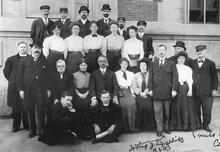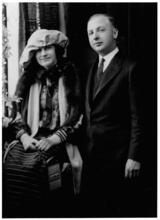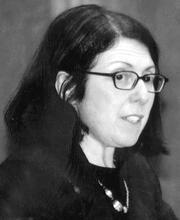Madeleine Borg
Madeleine Borg, a juvenile rights advocate, is known for reframing juvenile rehabilitation efforts in both Jewish and non-Jewish communities. Borg founded the American Big Sisters movement in 1912, which assisted girls arraigned in Children’s Courts and provided them with female role models. Borg went on to establish the Council Home for Jewish Girls which, through female mentorship, empowered girls who were arraigned in juvenile courts for misconduct. In 1939, she became the first woman to serve as the head of the Jewish Philanthropies. From 1942 to 1952, Borg served as President of the Jewish Board of Guardians, leading efforts to provide social services for the Jewish community. The Jewish Board of Guardians named their Child Guidance Institute in Borg’s honor in 1955, and she passed away a year later.
Early Life
Madeleine Beer Borg was born on July 31, 1878, to a well-to-do family in New York City. She had one sister, Alice B. Carns. As a young woman, Borg was passionate about serving community needs, especially in addressing the overcrowding and squalor in which many Jews lived. Later, this interest expanded to serving communities of all races and religions. Although Borg never pursued a college degree, she took courses at Columbia University, where she studied sociology and concentrated on the causes of juvenile delinquency. In 1898, she married banker Sidney C. Borg, with whom she had two daughters.
Borg once stated that she decided to enter the world of social work because she “was fortunate in having sufficient money to provide for all my desires or whims [but]…was unfortunate in having nothing to do. I was bored to death” (New York Times, 1956). By 1912, eager to channel her passions into positively impacting her community, Borg began to volunteer at a Children’s Court in New York City. These courts, which had been established in the United States only thirteen years earlier, reframed attitudes toward juvenile delinquency. “When I started there [the Children’s Court], there used to be good children and bad children,” she said later, “Now there are well children and disturbed children” (New York Times, 1956). In addition to serving children arraigned in Children’s Courts, Borg made speeches advocating for women’s suffrage and was one of the first members of the Women’s City Club and the League of Women Voters.
Big Sister Movement
In 1912, in response to the lack of probation staff for Jewish children arraigned in Children’s Courts, Borg established the Jewish Big Sisters Movement along the lines of the Catholic Big Sisters and Protestant Big Sisters. The Jewish Big Sisters Movement initially sought to provide volunteer probation officers for girls arraigned in Children’s Courts, but volunteers also took on larger roles as role models for young girls. In 1913, the Big Sisters Organization established the Council Home for Jewish Girls (later known as the Cedar Knolls School for Girls). The home was dedicated to the rehabilitation of Jewish girls accused of misconduct, including peddling, “improper guardianship,” “malicious mischief,” “incorrigibility,” “immorality,” stabbing or assault, and petty larceny. According to Borg, these girls were “not hardened criminals, but only children deprived of their natural heritage and rights…it was our duty to assist [them]” (quoted in Friedman).
Instead of viewing juvenile delinquency as an irreparable issue arising from within the child, Borg assigned blame to the external pressures that contributed to their misbehaviors. She pointed to the poor conditions many Jews endured as a critical force, stating that “the Jews…with their strong religious principles and…high…ideals as to the chastity of their persons, thrown into new surroundings, where the customs of the country are strange and incomprehensible to them, amid different economic conditions, where the struggle for existence is so keen, find many of their cherished beliefs slipping away from them as impossible and unpredictable” (quoted in Friedman).
In her leadership in the Big Sisters movement and the Council Home for Jewish Girls, Borg applied her belief in the power of female role models to the rehabilitation efforts. In 1917, she commented that in the Council Home for Jewish Girls, “we have always borne in mind the importance of surrounding these girls with women of refinement and ideals, who, both by precept and example, would influence the girls to a loftier viewpoint in life” (quoted in Friedman). To Borg, female mentorship was an effective mode of rehabilitation and a crucial source of empowerment among girls searching for inspiration.
Later Career
Madeleine Borg dedicated herself to a wide range of causes over the course of her career. In 1929, she was appointed simultaneously by Governor Franklin D. Roosevelt to serve on a commission to study New York State’s old-age pension system and to the executive committee of the New York City Crime Prevention Bureau. In 1939, she became the first woman to serve as the Federation of Jewish Philanthropies president, after founding the organization’s women’s division. Three years later, she was appointed President of the Jewish Board of Guardians (JBG), a position she held until 1951. The JBG, an organization that established programs to provide social services and prevent homelessness, focused especially on counseling and mental health causes when Borg served in its leadership in the 1940s and 1950s. During World War II, Borg managed the Manhattan branch of the Civil Defense volunteer organization and co-chaired the Hospitality Welfare Committee of the New York City Defense Recreation Committee.
Personal Life and Recognition
Madeleine Borg’s contributions to issues surrounding juvenile delinquency, the Jewish community, and the greater public have been recognized and celebrated. In 1951, she received an honorary degree of Doctor of Humane Letters from Columbia University, for her “outstanding work” in the field of juvenile delinquency prevention. In 1955, the Jewish Board of Guardians named its Child Guidance Institute in her honor.
Borg set a precedent for female activism. She once said that every woman should engage herself in “charity, politics, society (by which I mean amusement), cultural activities, and her family” (New York Times, 1956). Borg enjoyed visiting art galleries and stated that she was “mad about the movies.” Madeleine Borg, “blue-eyed, tireless, and always impeccably dressed,” is remembered for her unwavering commitment to improving the lives of individuals inside and outside the Jewish community through an unprecedented focus on mental health and empowerment. On January 9, 1956, Borg passed away in New York at age 77, due to circulatory issues.
Celebrating a Century of Caring: Jewish Board of Family and Children’s Services. New York: JBFCS, 1992, https://jewishboard.org/wp-content/uploads/2021/05/jb_century_of_caring.pdf.
“Columbia Awards.” The American Jewish World, January 15, 1951. From National Library of Israel Archives. https://www.nli.org.il/en/newspapers/amjwld/1951/06/15/01/article/28/?srpos=3&e=-------en-20--1--img-txIN%7ctxTI-madeline+borg-------------1 (accessed March 9, 2023).
Friedman, Reena Sigman. "Cedar Knolls School for Girls." Shalvi/Hyman Encyclopedia of Jewish Women. 31 December 1999. Jewish Women's Archive. (Viewed on March 24, 2023) https://jwa.org/encyclopedia/article/cedar-knolls-school-for-girls.
“Mrs. Borg Dead; Social Worker, 77.” The New York Times, January 10, 1956.
“Mrs. Borg Honored.” The New York Times, June 17, 1954.
“Obituary 4.” New York Times, January 10, 1956.
UJE, Volume 2, page 473.
WWIAJ (1926) page 75.

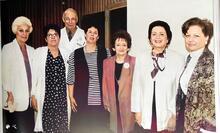
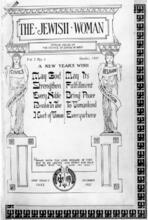
![roisman.jpg - still image [media] roisman.jpg - still image [media]](/sites/default/files/styles/medium/public/mediaobjects/roisman.jpg?itok=7iKIF0ev)
